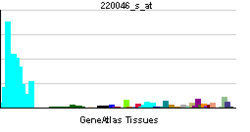CCNL1
| View/Edit Human | View/Edit Mouse |
Cyclin-L1 is a protein that in humans is encoded by the CCNL1 gene.[3][4]
References
- ↑ "Human PubMed Reference:".
- ↑ "Mouse PubMed Reference:".
- ↑ Dickinson LA, Edgar AJ, Ehley J, Gottesfeld JM (Jul 2002). "Cyclin L is an RS domain protein involved in pre-mRNA splicing". J Biol Chem. 277 (28): 25465–73. doi:10.1074/jbc.M202266200. PMID 11980906.
- ↑ "Entrez Gene: CCNL1 cyclin L1".
Further reading
- Zhang QH, Ye M, Wu XY, et al. (2001). "Cloning and Functional Analysis of cDNAs with Open Reading Frames for 300 Previously Undefined Genes Expressed in CD34+ Hematopoietic Stem/Progenitor Cells". Genome Res. 10 (10): 1546–60. doi:10.1101/gr.140200. PMC 310934
 . PMID 11042152.
. PMID 11042152. - Berke JD, Sgambato V, Zhu PP, et al. (2001). "Dopamine and glutamate induce distinct striatal splice forms of Ania-6, an RNA polymerase II-associated cyclin". Neuron. 32 (2): 277–87. doi:10.1016/S0896-6273(01)00465-2. PMID 11683997.
- Redon R, Hussenet T, Bour G, et al. (2002). "Amplicon mapping and transcriptional analysis pinpoint cyclin L as a candidate oncogene in head and neck cancer". Cancer Res. 62 (21): 6211–7. PMID 12414649.
- Strausberg RL, Feingold EA, Grouse LH, et al. (2003). "Generation and initial analysis of more than 15,000 full-length human and mouse cDNA sequences". Proc. Natl. Acad. Sci. U.S.A. 99 (26): 16899–903. doi:10.1073/pnas.242603899. PMC 139241
 . PMID 12477932.
. PMID 12477932. - Clark HF, Gurney AL, Abaya E, et al. (2003). "The Secreted Protein Discovery Initiative (SPDI), a Large-Scale Effort to Identify Novel Human Secreted and Transmembrane Proteins: A Bioinformatics Assessment". Genome Res. 13 (10): 2265–70. doi:10.1101/gr.1293003. PMC 403697
 . PMID 12975309.
. PMID 12975309. - de Graaf K, Hekerman P, Spelten O, et al. (2004). "Characterization of cyclin L2, a novel cyclin with an arginine/serine-rich domain: phosphorylation by DYRK1A and colocalization with splicing factors". J. Biol. Chem. 279 (6): 4612–24. doi:10.1074/jbc.M310794200. PMID 14623875.
- Ota T, Suzuki Y, Nishikawa T, et al. (2004). "Complete sequencing and characterization of 21,243 full-length human cDNAs". Nat. Genet. 36 (1): 40–5. doi:10.1038/ng1285. PMID 14702039.
- Beausoleil SA, Jedrychowski M, Schwartz D, et al. (2004). "Large-scale characterization of HeLa cell nuclear phosphoproteins". Proc. Natl. Acad. Sci. U.S.A. 101 (33): 12130–5. doi:10.1073/pnas.0404720101. PMC 514446
 . PMID 15302935.
. PMID 15302935. - Gerhard DS, Wagner L, Feingold EA, et al. (2004). "The Status, Quality, and Expansion of the NIH Full-Length cDNA Project: The Mammalian Gene Collection (MGC)". Genome Res. 14 (10B): 2121–7. doi:10.1101/gr.2596504. PMC 528928
 . PMID 15489334.
. PMID 15489334. - Sticht C, Hofele C, Flechtenmacher C, et al. (2005). "Amplification of Cyclin L1 is associated with lymph node metastases in head and neck squamous cell carcinoma (HNSCC)". Br. J. Cancer. 92 (4): 770–4. doi:10.1038/sj.bjc.6602400. PMC 2361871
 . PMID 15700036.
. PMID 15700036. - Muller D, Millon R, Théobald S, et al. (2006). "Cyclin L1 (CCNL1) gene alterations in human head and neck squamous cell carcinoma". Br. J. Cancer. 94 (7): 1041–4. doi:10.1038/sj.bjc.6603036. PMC 2361229
 . PMID 16598186.
. PMID 16598186.
This article is issued from Wikipedia - version of the 6/6/2016. The text is available under the Creative Commons Attribution/Share Alike but additional terms may apply for the media files.
